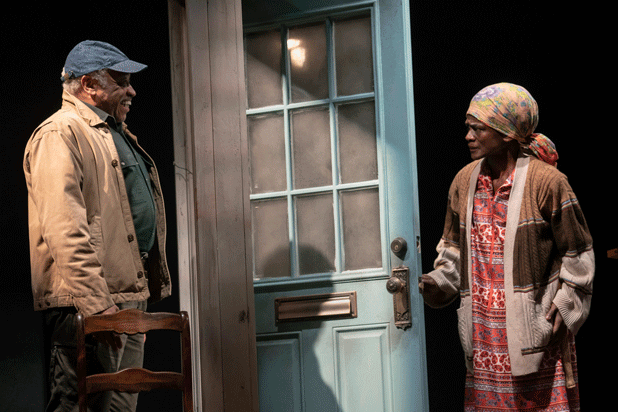‘Runboyrun’ and ‘In Old Age’ Theater Review: Nigerian American Immigrants Can’t Shake the Past
Mfoniso Udofia imagines a different take on the African diaspora: The characters in what she intends to be a nine-play Ufot Cycle are educated Nigerians who arrived in the United States long after slavery, in the 1970s, but still grapple with the legacy of violence in their homeland.
Udofia’s new plays, “runboyrun” and “In Old Age,” are set decades apart — they are intended to be the third and eighth play in the saga — but situated, mostly, in the same single-family home in Worcester, Massachusetts, where Abasiama Ufot has settled with her professor husband Disciple. (The shows, staged as a three-hour entertainment with intermission, opened Monday at Off Broadway’s New York Theatre Workshop — which two years ago jointly staged the first and fourth plays, “Sojourners” and “Her Portmanteau.”)
Both new works seem contingent on the other plays in the cycle in ways that may frustrate some audiences. Who are these grown children of the couple that we hear about but never meet? Why does Abasiama (Patrice Johnson Chevannes) bury herself beneath laundry on the couple’s living-room sofa, secretly filling out job applications and begging her husband to use their one car to attend her own church? And why does Disciple (Chiké Johnson) seem to rage at his wife at these attempts at autonomy — and just about everything else?
That last mystery, at least, is explained in “runboyrun,” which dramatizes the hallucinations and flashbacks of the post-traumatic stress disorder he suffers from his boyhood experience fleeing the horrors of the Biafra Civil War. He finds himself both feeling the ghostly presence of his boyhood self (Karl Green), his mother (Zenzi Williams), brother (Adesola Osakalumi) and sister (Adrianna Mitchell) — as well as actually speaking aloud to them in an apparent mental break that both confuses and alarms his wife.
Udofia sketches the contradictions of this man, who is both scholarly and superstitious, but the blend of naturalism and magic realism doesn’t always work — especially under Loretta Greco’s sometimes overly broad direction. And this momentous day-in-the-life story simply has too many dramatic turns and reversals to seem credible: We never understand why a character as smart and sympathetic as Abasiama would behave as she does.

“In Old Age” (Photo: Joan Marcus)
By the time of “In Old Age,” set decades later, Abasiama’s homebodiness has calcified into the outright crotchety. In this two-hander, she encounters a handyman (played with finely tuned forbearance by Ron Canada) hired by her unseen children to help renovate her now-dilapidated home.
Over time, he manages to chip away at both her decrepit floorboards as well as the barriers she has put up to any outsiders. They find an unlikely, cherry-stained common ground. While Udofia still can’t resist her admittedly poetic speechifying, this chapter unfolds more plausibly under Awoye Timpo’s restrained direction.
Read original story ‘Runboyrun’ and ‘In Old Age’ Theater Review: Nigerian American Immigrants Can’t Shake the Past At TheWrap

